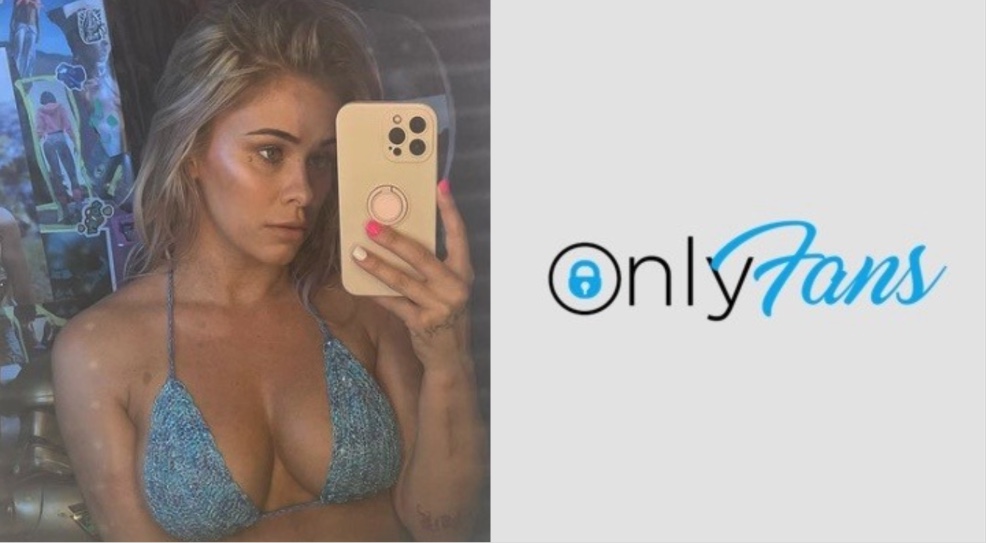Paige VanZant OnlyFans Leak: Beyond The Scandal | News & Analysis
Is a leaked OnlyFans account truly just another celebrity scandal, or does it represent something far more significant about our digital world?
The controversy surrounding Paige VanZant's OnlyFans account serves as a stark illustration of the evolving challenges of privacy, the complexities of digital entrepreneurship, and the responsibilities of online platforms in the modern era.
The online landscape is perpetually shifting, and with it, the boundaries of privacy and personal expression. The recent revelation of leaked content from Paige VanZant's OnlyFans account has ignited a firestorm of discussion, extending far beyond the realm of celebrity gossip. The incident underscores the vulnerability of individuals in the digital age and raises serious questions about the protection of personal information and the ethics of online content distribution. As a former UFC fighter and current AEW wrestler, VanZant's foray into the adult content industry, like many others, was aimed at providing exclusive content for her fans. However, the unauthorized dissemination of her private material has placed her in a position where her personal life has become a public spectacle.
| Attribute | Details |
|---|---|
| Full Name | Paige Michelle VanZant |
| Date of Birth | March 26, 1994 |
| Place of Birth | Dundee, Oregon, USA |
| Height | 5 ft 4 in (163 cm) |
| Weight | 125 lb (57 kg; 8 st 13 lb) |
| Sport(s) | Mixed Martial Arts, Bare Knuckle Boxing, Professional Wrestling |
| Years Active (MMA) | 20122021 |
| Years Active (Bare Knuckle Boxing) | 2021-Present |
| Years Active (Professional Wrestling) | 2022-Present |
| Husband | Austin Vanderford |
| Notable Achievements |
|
| Social Media | |
| Reference | Sherdog.com |
The unauthorized release of private content has far-reaching consequences, especially for public figures like VanZant. The incident serves as a reminder of the potential for reputational damage, the emotional toll on those involved, and the legal complexities that arise in cases of privacy violations. It is a stark reminder of the power of the internet and the need for individuals to be vigilant in protecting their online privacy. The leak of her intimate content occurred when private videos and photos from her account were shared without her consent, leading to a wave of online scrutiny and criticism. It is unclear exactly how the breach happened, but it is suspected that the hack came from a third party who gained access to her content either through data breaches, hacking, or the actions of subscribers who then distributed the material.
One of the most shocking revelations was the circulation of intimate photographs and videos allegedly featuring Paige VanZant. These explicit materials were reportedly obtained and shared without her consent, leading to a wave of online scrutiny and criticism. In addition to the emotional impact, the leak of private content has also posed a threat to Paige VanZants personal brand and professional career. As a public figure and athlete, she has worked hard to build a strong and positive image, and the unauthorized release of private material has the potential to significantly damage her reputation. Beyond the scandal, the Paige VanZant OnlyFans controversy is more than a tabloid story; its a lens into the complexities of digital entrepreneurship, gender dynamics, and platform accountability.
The Paige VanZant OnlyFans leak has left an indelible mark on the online content creation industry, serving as a reminder of the challenges and vulnerabilities that creators face in the digital age. The incident is not an isolated one but part of a larger pattern of privacy violations in the digital age. It raises critical questions about the responsibilities of technology companies, the legal protections available to individuals, and societal attitudes toward privacy and consent. The case underscores the crucial need for comprehensive digital privacy legislation, robust security measures, and a fundamental shift in societal attitudes toward online privacy and personal data. The leak of Paige VanZants OnlyFans content occurred when private videos and photos from her account were shared without her consent. It is unclear exactly how the breach happened, but it is suspected that the hack came from a third party who gained access to her content either through data breaches, hacking, or through the actions of subscribers who then shared the content.
This unfortunate event has sparked a series of discussions on social media and various online platforms. It has triggered conversations among her followers, prompting them to express their concerns and perspectives regarding the situation. Some supporters have come to her defense, condemning the actions of those who leaked her private content and calling for greater online accountability. The incident has served as a poignant reminder of the potential dangers associated with the digital landscape. It highlights the importance of online privacy and the urgent need for stringent security measures to safeguard personal information.
According to reports, the breach involved explicit content, including photos and videos, that were disseminated without her consent, triggering a wave of criticism and scrutiny. The unauthorized sharing of such private content underscores the severity of the breach and the potential harm caused. This highlights the importance of platform accountability in handling user data and preventing security breaches. In light of this incident, it's crucial to assess the legal ramifications surrounding leaked content. Navigating the legal landscape necessitates a deep understanding of copyright law, privacy invasion, and individuals' digital rights. The incident serves as a reminder of the ever-present risks associated with online platforms and the need for enhanced security measures.
Furthermore, the case raises critical questions about the responsibilities of technology companies, the legal protections available to individuals, and society's attitudes toward privacy and consent. It underscores the necessity for comprehensive digital privacy legislation, robust security measures, and a significant shift in societal attitudes towards online privacy and personal data. The leak of Paige VanZant's OnlyFans content, occurring when private videos and photos from her account were shared without her consent, is a stark reminder of the vulnerabilities that creators face in the digital realm. The incident also prompts a reevaluation of security measures to safeguard user data and prevent future privacy violations. The unauthorized release of such intimate material has the potential to inflict considerable damage on her brand and career, raising pertinent questions regarding the preservation of personal and professional reputations.
In addition to the direct impact on VanZant, the incident has also highlighted broader issues within the adult content industry. The lack of robust security measures, the prevalence of data breaches, and the potential for malicious actors to exploit vulnerabilities have all come under scrutiny. The challenges that content creators face in maintaining their privacy and control over their work are amplified in this context. The episode underscores the critical need for platforms to take greater responsibility for user data protection and to provide creators with the resources and support they need to navigate the complexities of the digital world. The incident underscores the importance of platform accountability in handling user data and preventing security breaches. It's crucial to assess the legal ramifications surrounding leaked content, as navigating the legal landscape requires a deep understanding of copyright law, privacy invasion, and individuals' digital rights.
As a public figure and athlete, Paige VanZant has consistently worked to cultivate a strong and positive image. The unauthorized release of private material poses a significant threat to her professional standing and personal brand, necessitating measures to mitigate potential damages. The circumstances surrounding this event serve as a cautionary tale, emphasizing the significance of vigilance in safeguarding personal information. It highlights the importance of implementing robust security measures, embracing digital privacy, and adopting a comprehensive approach to manage online presence. In an era marked by evolving technological advances and an increased emphasis on digital interactions, safeguarding privacy has become more critical than ever.
The repercussions of the leak extend beyond the emotional toll on VanZant. It affects her professional career and personal brand, highlighting the need for preventative measures. The incident highlights the continued challenges of maintaining digital privacy and the vulnerabilities of online platforms. It's not just about the immediate violation of privacy; its about the potential for long-term harm to her reputation and career, which is built on her image as a fighter and entrepreneur. The leak is a stark reminder of the potential pitfalls of digital entrepreneurship and the need for creators to carefully navigate the online landscape.
The response to the leak has varied, with some expressing support for VanZant and others focusing on the ethical considerations of the situation. This highlights the complex nature of privacy in the digital age and the conflicting views on consent and online content. It serves as a reminder of the power of social media and the potential for online scrutiny to impact individuals' lives. The situation calls for a reevaluation of societal attitudes toward privacy, consent, and the responsibilities of both individuals and platforms. The incident also spotlights the role of social media in disseminating and amplifying private information, thus highlighting the critical need for stronger protective measures and legal frameworks.
The incident has also raised questions about the role of the OnlyFans platform and its responsibility for the content shared on its site. The platform's security measures, content moderation policies, and response to the leak have come under scrutiny. This underscores the need for platforms to prioritize user safety and privacy and to take swift action when breaches occur. The situation calls for a reevaluation of societal attitudes toward privacy, consent, and the responsibilities of both individuals and platforms. Navigating the legal landscape surrounding leaked content requires a deep understanding of copyright law, invasion of privacy, and the digital rights of individuals. The case raises questions about the legal protections and rights of content creators in the digital age.
The conversation around the Paige VanZant OnlyFans leak transcends the realm of celebrity gossip. Its a complex illustration of the challenges faced by creators in the digital age. It also highlights the importance of platform accountability, the need for robust security measures, and the ongoing evolution of societal attitudes toward privacy and consent. It raises critical questions about the responsibilities of technology companies, the legal protections available to individuals, and societal attitudes toward privacy and consent. The leak of Paige VanZant's content is not an isolated incident but part of a larger pattern of privacy violations in the digital age.
The former UFC fighter's story offers a lens through which we can better understand the intricacies of digital entrepreneurship and the importance of safeguarding personal information in the digital age. It also emphasizes the necessity of robust security measures and responsible platform behavior. The breach of her OnlyFans account is a potent reminder of the vulnerabilities that exist in the digital world and the need for proactive measures to ensure privacy and protect individuals from the potential negative consequences of online content distribution. It is essential that platforms, individuals, and society as a whole work collaboratively to foster a more secure and ethical online environment.


